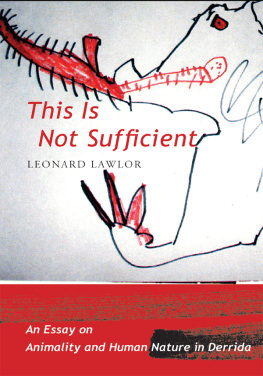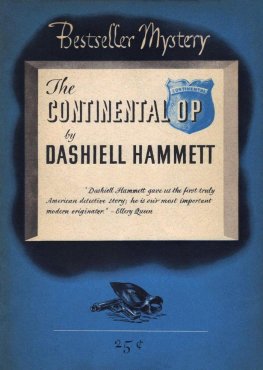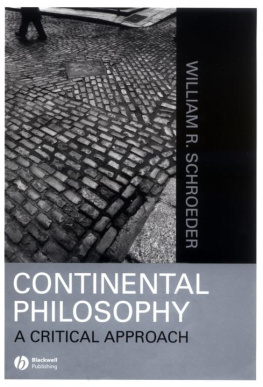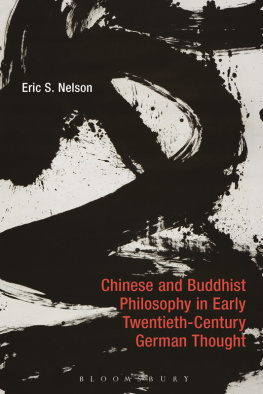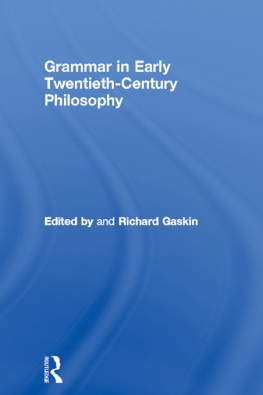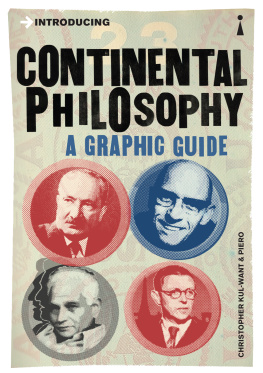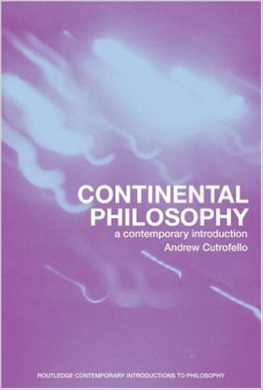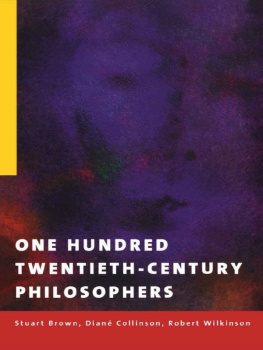Leonard Lawlor - Early Twentieth-Century Continental Philosophy
Here you can read online Leonard Lawlor - Early Twentieth-Century Continental Philosophy full text of the book (entire story) in english for free. Download pdf and epub, get meaning, cover and reviews about this ebook. year: 2012, publisher: Indiana University Press, genre: Religion. Description of the work, (preface) as well as reviews are available. Best literature library LitArk.com created for fans of good reading and offers a wide selection of genres:
Romance novel
Science fiction
Adventure
Detective
Science
History
Home and family
Prose
Art
Politics
Computer
Non-fiction
Religion
Business
Children
Humor
Choose a favorite category and find really read worthwhile books. Enjoy immersion in the world of imagination, feel the emotions of the characters or learn something new for yourself, make an fascinating discovery.

- Book:Early Twentieth-Century Continental Philosophy
- Author:
- Publisher:Indiana University Press
- Genre:
- Year:2012
- Rating:3 / 5
- Favourites:Add to favourites
- Your mark:
- 60
- 1
- 2
- 3
- 4
- 5
Early Twentieth-Century Continental Philosophy: summary, description and annotation
We offer to read an annotation, description, summary or preface (depends on what the author of the book "Early Twentieth-Century Continental Philosophy" wrote himself). If you haven't found the necessary information about the book — write in the comments, we will try to find it.
Leonard Lawlor: author's other books
Who wrote Early Twentieth-Century Continental Philosophy? Find out the surname, the name of the author of the book and a list of all author's works by series.
Early Twentieth-Century Continental Philosophy — read online for free the complete book (whole text) full work
Below is the text of the book, divided by pages. System saving the place of the last page read, allows you to conveniently read the book "Early Twentieth-Century Continental Philosophy" online for free, without having to search again every time where you left off. Put a bookmark, and you can go to the page where you finished reading at any time.
Font size:
Interval:
Bookmark:
EARLY TWENTIETH-CENTURY
CONTINENTAL PHILOSOPHY
STUDIES IN CONTINENTAL THOUGHT
John Sallis, editor
CONSULTING EDITORS
Robert Bernasconi | J. N. Mohanty |
Rudolph Bernet | Mary Rawlinson |
John D. Caputo | Tom Rockmore |
David Carr | Calvin O. Schrag |
Edward S. Casey | Reiner Schrmann |
Hubert Dreyfus | Charles E. Scott |
Don Ihde | Thomas Sheehan |
David Farrell Krell | Robert Sokolowski |
Lenore Langsdorf | Bruce W. Wilshire |
Alphonso Lingis | David Wood |
William L. McBride |
Continental Philosophy
Leonard Lawlor

This book is a publication of
Indiana University Press
601 North Morton Street
Bloomington, IN 47404-3797 USA
www.iupress.indiana.edu
Telephone orders 800-842-6796
Fax orders 812-855-7931
2012 by Leonard Lawlor
All rights reserved
No part of this book may be reproduced or utilized in any form or by any means, electronic or mechanical, including photocopying and recording, or by any information storage and retrieval system, without permission in writing from the publisher. The Association of American University Presses Resolution on Permissions constitutes the only exception to this prohibition.
 The paper used in this publication meets the minimum requirements of the American National Standard for Information SciencesPermanence of Paper for Printed Library Materials, ANSI Z39.48-1992.
The paper used in this publication meets the minimum requirements of the American National Standard for Information SciencesPermanence of Paper for Printed Library Materials, ANSI Z39.48-1992.
Manufactured in the United States of America
Library of Congress Cataloging-in-Publication Data
Lawlor, Leonard, [date]
Early twentieth-century Continental philosophy / Leonard Lawlor.
p. cm. (Studies in Continental thought)
Includes bibliographical references (p. ) and index.
ISBN 978-0-253-35702-1 (cloth : alk. paper) ISBN 978-0-253-22372-2 (pbk. : alk. paper) ISBN 978-0-253-00516-8 (electronic book) 1. Continental philosophyHistory20th century. I. Title.
B804.L35 2012
190.904dc23
2011027334
1 2 3 4 5 17 16 15 14 13 12
The book you are about to read concerns early twentieth-century continental philosophy, that is, French and German philosophy from 1903, the original publication date of Bergsons Introduction to Metaphysics, to 1966, the original publication date of Foucaults The Thought of the Outside. This book aims to be a general introduction to continental philosophy. It should enable one to study, with insight, not only the figures covered here (Bergson, Freud, Husserl, early Heidegger, later Heidegger, later Merleau-Ponty, and early Foucault), but also most of the central texts written after the 1950s by Derrida, Deleuze, Deleuze and Guattari, Foucault, Lacan, Levinas, Lyotard, Gadamer, and the so-called French feminists such as Irigaray and Kristeva. Although one strain of European thought has usually defined continental philosophy, that is, phenomenology (both its German and French versions)and we shall spend a significant amount of time discussing phenomenologywe shall consider three other strains: Bergsonism, psychoanalysis, and then finally what is commonly called structuralism (although we shall not use the word structuralism below).
In a survey of early twentieth-century continental philosophy, more could be said here; we could have included a discussion of the Frankfurt school (Adorno, for example), Levinas, or Sartre. These exclusions indicate that there is an idiosyncratic reason for the selection of the figures examined here. It seems to me that the specific figures selected set up what I have called the great French philosophy of the Sixties.two ways, which overlap and intersect. On the one hand, the outside is the external as opposed to the internal; for example, the unconscious as opposed to consciousness. On the other, the outside is the difference between oppositions such as the conscious and the unconscious, psychological consciousness and transcendental consciousness, being and beings, the visible and the invisible. In this sense, the between is a fold, a gap, a minuscule hiatus, un cart infime (MC: 351/OT: 340). The minuscule hiatus joins as it disjoins events and repetitions; below the difference therefore a multiplicity of traits swarms. We must not underestimate the importance of this comment from Deleuzes 1968 Difference and Repetition:
There is a crucial experience of difference and a corresponding experiment: every time we find ourselves confronted or bound by a limitation or an opposition, we should ask what such a situation presupposes. It presupposes a swarm of differences, a pluralism of free, wild or untamed differences, a properly differential and original space and time, all of which persist across the simplification of limitation and opposition.
Or this one, ten years later, from Foucaults 1978 course Security, Territory, Population:
Must intelligibility arise in no other way than through the search for the one that splits into two or produces the two? Could we not, for example, start not from the unity, and not even from [the] nature-state duality, but from the multiplicity of extraordinarily diverse processes?
Or finally, this one, more than twenty years later, from Derridas 2001 course The Beast and the Sovereign:
Every time one puts an oppositional limit in question, far from concluding that there is identity, we must on the contrary multiply attention to differences, refine the analysis in a restructured field.
Derrida and Foucault would call these untamed differences a murmur; Deleuze says clamor. Thoughtor philosophytherefore consists in listening to this clamoring murmur. Late in his career, in his 1984 What Is Enlightenment? essay, Foucault laid out a project for philosophizing: to separate out, from the contingency that has made us what we are, the possibility of no longer being, doing, or thinking what we are, do, or think. He called this transformative project the indefinite work of freedom. That the work of freedom is indefinite means that it is always incomplete, that freedom is always still to come, that the work always raises further questions. It is these further questions that define and drive, that must drive, still today, what we call continental philosophy.
The fact that Derrida, Deleuze, and Foucault are no longer with us should make us consider the condition of what we call continental philosophy. The immense popularity of the term cannot be denied, and yet, as so many recent attempts have demonstrated, it seems virtually undefinable. Or at best it is defined as a catchall phrase for all the kinds of philosophy that analytic philosophy does not welcome, from mystical discourse to race theory. At worst, it refers to the exposition of the ideas of French and German philosophers, most of whom, like Derrida, Deleuze, and Foucault, are now dead. What future can there be for continental philosophy when it is nothing more than exposition? What future can a hodgepodge of ideas have? Is it possible to determine something like a project for continental philosophy? Early Twentieth-Century Continental Philosophy attempts to answer this question. Indeed, the selection of the figures discussed in this book arose from the attempt, my attempt, to conceive continental philosophy as a philosophical project (or a philosophical research agenda). In other words, if it is true that the great diversity of texts and authors usually associated with continental philosophy seems not to constitute anything remotely like a tradition, then by selecting certain philosophers (and not others) I am attempting to show that a tradition can be constituted.
Next pageFont size:
Interval:
Bookmark:
Similar books «Early Twentieth-Century Continental Philosophy»
Look at similar books to Early Twentieth-Century Continental Philosophy. We have selected literature similar in name and meaning in the hope of providing readers with more options to find new, interesting, not yet read works.
Discussion, reviews of the book Early Twentieth-Century Continental Philosophy and just readers' own opinions. Leave your comments, write what you think about the work, its meaning or the main characters. Specify what exactly you liked and what you didn't like, and why you think so.


